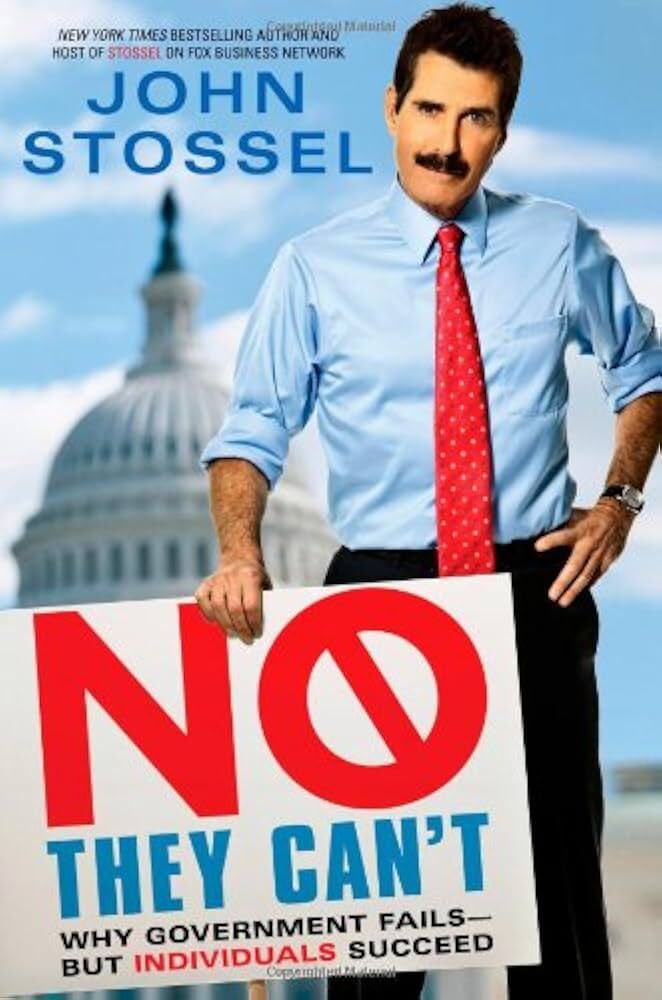
THE best TV reporters are also first-rate news writers. They usually have a minute or less to read what they’ve written, so they write simply, clearly and to the point. Former ABC News investigative reporter John Stossel is one of them.
In his first book, “Give Me A Break,” published in 2004, Stossel said as a consumer reporter he was praised by his peers for his “bravery” in going after “the unjust and the wicked.” They called his reporting “hard-hitting,” a “public service.” He won 18 (!) Emmys. Then, he said, he “did a terrible thing.” He began applying his skepticism to government and “public service” groups. “This,” he said, “apparently violated a religious tenet of journalism. Suddenly I was no longer ‘objective.’ ” That is, leftist. So they called him a “sellout.”
His response is to continue calling it like he sees it.
His third book, “No, They Can’t: Why Government Fails — But Individuals Succeed” (2012), was published when “hope and change” was the catchphrase of those who believed they could usher in both by saying it repeatedly, like Dorothy clicking her heels in “The Wizard of Oz.”
Stossel acknowledges that many of us “crave simple answers that give us the impression that some higher power determines our fates.” He is not referring to God or religion. No. “The worst superstition,” he said, and “the most socially destructive of all…is the intuitively appealing belief that when there is a problem, government action is the best way to solve it.”
If I read Stossel’s book when I was a young reporter/editor I probably would have dismissed him as a right-wing nut. But after 30 years of covering, reading about, writing about, and immersing myself in politics and the workings of government, and seeing them up close, I find it hard to disagree with Stossel.
Since ancient times, the “problems” of politics and governance have not been bugs but their main features — no matter who’s in charge, what the constitution or the laws say or what the form of government is. Not surprisingly, polls over the years have shown that voters are usually dissatisfied with government. Many people are also aware that government “planning” usually misses the mark or is a dismal failure. As economist and historian Robert Higgs has noted, “Here in the United States we have been flinging rascals [in government] hither and yon for more than two centuries. But what do we have to show for it?”
“What government usually does,” Stossel said, “is make the problem worse….” So why don’t we ever learn? “Because there are always problems that must be solved!” he said. “And there are always politicians pretending to be problem solvers. They are so interested in our welfare that it’s all they talk about. Some of them even went to Harvard, so they must be smart. So we believe them when they say, ‘Yes we can!’ ”
And what was the result of eight years of “Yes we can!” and “hope and change”?
MAGA.
As long as we “leap to the intuitive yet false conclusion that governments solve problems, we’re in big trouble,” Stossel said. “That’s why we keep increasing government power: it seems like the obvious solution. Yet such ‘solutions’ inevitably generate more problems for government to ‘solve.’ ”
Of course, government is not totally useless. But we would likely have fewer problems if it sticks to doing what it does best — maintain national security, uphold law and order, respond to emergencies, protect property rights, etc. (Or, in the felicitous words of Adam Smith, “peace, easy taxes, and a tolerable administration of justice.”)
Government is brute force. That’s why many of us think it’s a tool with which we can do more and accomplish a lot. However, if government is a tool, it is a tool like a sledgehammer, which is useful for breaking things, but useless for many other tasks.
Government, moreover, is run by politicians who, to get elected, have to propose “popular” measures that are usually economically illiterate or financially unsound. Politics, by its very nature, is always knee-deep in perverse incentives. The main objective is to win power, and then to wield it. Eventually, everything — including “principles” — is subsumed under the overriding goal of maintaining power.
As I’ve said before, someone should dig up all the significant laws passed since the first CNMI Legislature and compare their lofty goals and aims with the actual results of their implementation — if they were even implemented to begin with.
Like the 19th-century British philosopher Herbert Spencer, Stossel advises humility. “I know that my brain is full of biases and misperceptions,” he said, “but at least I am aware of the problem — and of a few of the important ways the human brain routinely goes wrong.”
Our “fatal conceit” is the belief that “experts” and/or “intelligent” and “virtuous” leaders with a grandiose now-or-never, once-and-for-all plan can successfully solve if not eradicate society’s problems. However, aside from the glorified, mythic version of the past, such a “positive” outcome has never been achieved and remains unlikely to occur. Which doesn’t mean that our self-appointed saviors and intellectual betters will cease their efforts to “help” us.
Send feedback to editor@mvariety.com











